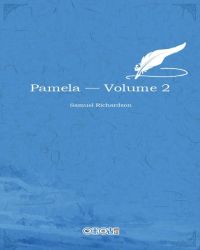LETTER XCVI
您可以在百度里搜索“Pamela — Volume 2 艾草文学(www.321553.xyz)”查找最新章节!
LETTER XCVI
DEAR SIR,
Mr. Locke gives a great many very pretty instructions relating to the play-games of children: but I humbly presume to object to what he says in one or two places.
He would not indulge them in any playthings, but what they make themselves, or endeavour to make. "A smooth pebble, a piece of paper, the mother's bunch of keys, or any thing they cannot hurt themselves with," he rightly says, "serve as much to divert little children, as those more chargeable and curious toys from the shops, which are presently put out of order, and broken."
These playthings may certainly do for little ones: but methinks, to a person of easy circumstances, since the making these toys employs the industrious poor, the buying them for the child might be complied with, though they were easily broken; and especially as they are of all prices, and some less costly, and more durable than others.
"Tops, gigs, battledores," Mr. Locke observes, "which are to be used with labour, should indeed be procured them—not for variety, but exercise; but if they had a top, the scourge-stick and leather strap should be left to their own making and fitting."
But I may presume to say, that whatever be the good Mr. Locke proposes by this, it cannot be equal to the mischief children may do themselves in making these playthings! For must they not have implements to work with? and is not a knife, or other edged tool, without which it is impossible they can make or shape a scourge-stick, or any of their playthings, a fine instrument in a child's hands! This advice is the reverse of the caution warranted from all antiquity, That it is dangerous to meddle with edged tools! and I am afraid, the tutor must often act the surgeon, and follow the indulgence with a styptic and plaister; and the young gentleman's hands might be so often bound up as to be one way to cure him of his earnest desire to play; but I can hardly imagine any other good that it can do him; for I doubt the excellent consequences proposed by our author from this doctrine, such as to teach the child moderation in his desires, application, industry, thought, contrivance, and good husbandry, qualities that, as he says, will be useful to him when he is a man, are too remote to be ingrafted upon such beginnings; although it must be confessed, that, as Mr. Locke wisely observes, good habits and industry cannot be too early inculcated.
But then, Sir, may I ask, Are not the very plays and sports, to which children accustom themselves, whether they make their own playthings or not, equivalent to the work or labour of grown persons! Yes, Sir, I will venture to say, they are, and more than equivalent to the exercises and labour of many.
Mr. Locke advises, that the child's playthings should be as few as possible, which I entirely approve: that they should be in his tutor's power, who is to give him but one at once. But since it is the nature of the human mind to court most what is prohibited, and to set light by what is in its own power; I am half doubtful (only that Mr. Locke says it, and it may not be so very important as other points, in which I have ventured to differ from that gentleman), whether the child's absolute possession of his own playthings in some little repository, of which he may be permitted to keep the key, especially if he makes no bad use of the privilege, would not make him more indifferent to them: while the contrary conduct might possibly enhance his value of them. And if, when he had done with any plaything, he were obliged to put it into its allotted place, and were accustomed to keep account of the number and places of them severally; this would teach him order, and at the same time instruct him to keep a proper account of them, and to avoid being a squanderer or waster: and if he should omit to put his playthings in their places, or be careless of them, the taking them away for a time, or threatening to give them to others, would make him the more heedful.
Mr. Locke says, that he has known a child so distracted with the number and variety of his playthings, that he tired his maid every day to look them over: and was so accustomed to abundance, that he never thought he had enough, but was always asking, "What more? What new thing shall I have?"—"A good introduction," adds he, ironically, "to moderate desires, and the ready way to make a contented happy man."
All that I shall offer to this, is, that few men are so philosophical as one would wish them to be, much less children. But, no doubt, this variety engaged the child's activity; which, of the two might be turned to better purposes than sloth or indolence; and if the maid was tired, it might be, because she was not so much alive as the child; and perhaps this part of the grievance might not be so great, because if she was his attendant, 'tis probable she had nothing else to do.
However, in the main, as Mr. Locke says, it is no matter how few playthings the child is indulged with; but yet I can hardly persuade myself, that plenty of them can have such bad consequences as he apprehends; and the rather, because they will excite his attention, and promote his industry and activity. His enquiry after new things, let him have few or many, is to be expected as a consequence to those natural desires which are implanted in him, and will every day increase: but this may be observed, that as he grows in years, he will be above some playthings, and so the number of the old ones will be always reducible, perhaps in a greater proportion, than the new ones will increase.
On the head of good-breeding, he observes, that, "there are two sorts of ill-breeding; the one a sheepish bashfulness, and the other a misbecoming negligence and disrespect in our carriage; both which," says he, "are avoided by duly observing this one rule, not to think meanly of ourselves, and not to think meanly of others." I think, as Mr. Locke explains this rule, it is an excellent one. But I would beg to observe upon it, that however discommendable a bashful temper is, in some instances, where it must be deemed a weakness of the mind, yet, in my humble opinion, it is generally the mark of an ingenuous one, and is always to be preferred to an undistinguishing and hardy confidence, which, as it seems to me, is the genuine production of invincible ignorance.
What is faulty in it, which he calls sheepishness, should indeed be shaken off as soon as possible, because it is an enemy to merit in its advancement in the world: but, Sir, were I to choose a companion for your Billy, as he grows up, I should not think the worse of the youth, who, not having had the opportunities of knowing men, or seeing the world, had this defect. On the contrary, I should be apt to look upon it as an outward fence or inclosure to his virtue, which might keep off the lighter attacks of immorality, the Hussars of vice, as I may say, who are not able to carry on a formal siege against his morals; and I should expect such a one to be docile, humane, good-humoured, diffident of himself, and therefore most likely to improve as well in mind as behaviour: while a hardened mind, that never doubts itself, must be a stranger to its own infirmities, and suspecting none, is impetuous, over-bearing, incorrigible; and, if rich, a tyrant; if not, possibly an invader of other men's properties; or at least, such a one as allows itself to walk so near the borders of injustice, that where self is concerned, it hardly ever does right things.
Mr. Locke proposes (Section 148) a very pretty method to cheat children, as it were, into learning: but then he adds, "There may be dice and playthings, with the letters on them, to teach children the alphabet by playing." And (Section 151) "I know a person of great quality, who, by pasting on the six vowels (for in our language y is one) on the six sides of a dice, and the remaining eighteen consonants on the sides of three other dice, has made this a play for his children, that he shall win, who at one cast throws most words on these four dice; whereby his eldest son, yet in coats, has played himself into spelling with great eagerness, and without once having been chid for it, or forced to it."
But I had rather your Billy should be a twelvemonth backwarder for want of this method, than forwarded by it. For what may not be feared from so early inculcating the use of dice and gaming, upon the minds of children? Let Mr. Locke himself speak to this in his Section 208, and I wish I could reconcile the two passages in this excellent author. "As to cards and dice," says he, "I think the safest and best way is, never to learn any play upon them, and so to be incapacitated for these dangerous temptations, and encroaching wasters of useful time." And, he might have added, of the noblest estates and fortunes; while sharpers and scoundrels have been lifted into distinction upon their ruins. Yet, in § 153, Mr. Locke proceeds to give directions in relation to the dice he recommends.
But after all, if some innocent plays were fixed upon to cheat children into reading, that, as he says, should look as little like a task as possible, it must needs be of use for that purpose. But let every gentleman, who has a fortune to lose, and who, if he games, is on a foot with the vilest company, who generally have nothing at all to risque, tremble at the thoughts of teaching his son, though for the most laudable purposes, the early use of dice and gaming.
But how much I am charmed with a hint in Mr. Locke, which makes your Pamela hope, she may be of greater use to your children, even as they grow up, than she could ever have flattered herself to be. 'Tis a charming paragraph; I must not skip one word of it. Thus it begins, and I will observe upon it as I go along. § 177: "But under whose care soever a child is put to be taught, during the tender and flexible years of his life, this is certain, it should be one who thinks Latin and language the least part of education."
How agreeable is this to my notions; which I durst not have avowed, but after so excellent a scholar! For I have long had the thought, that much time is wasted to little purpose in the attaining of Latin. Mr. H., I think, says he was ten years in endeavouring to learn it, and, as far as I can find, knows nothing at all of the matter neither!—Indeed he lays that to the wicked picture in his grammar, which he took for granted (as he has often said, as well as once written) was put there to teach boys to rob orchards, instead of improving their minds in learning, or common honesty.
But (for this is too light an instance for the subject) Mr. Locke proceeds—"One who knowing how much virtue and a well-tempered soul is to be preferred to any sort of learning or language," [What a noble writer is this!] "makes it his chief business to form the mind of his scholars, and give that a right disposition:" [Ay, there, dear Sir, is the thing!] "which, if once got, though all the rest should be neglected," [charmingly observed!] "would, in due time," [without wicked dice, I hope!] "produce all the rest; and which, if it be not got and settled, so to keep out ill and vicious habits, languages and sciences, and all the other accomplishments of education, will be to no purpose, but to make the worse or more dangerous man." [Now comes the place I am so much delighted with!] "And indeed, whatever stir there is made about getting of Latin, as the great and difficult business, his mother" [thank you, dear Sir, for putting this excellent author into my hands!] "may teach it him herself, if she will but spend two or three hours in a day with him," [If she will! Never fear, but I will, with the highest pleasure in the world!] "and make him read the Evangelists in Latin to her." [How I long to be five or six years older, as well as my dearest babies, that I may enter upon this charming scheme!] "For she need but buy a Latin Testament, and having got somebody to mark the last syllable but one, where it is long, in words above two syllables (which is enough to regulate her pronunciation and accenting the words), read daily in the Gospels, and then let her avoid understanding them in Latin, if she can."
Why, dear Sir, you have taught me almost all this already; and you, my beloved tutor, have told me often, I read and pronounce Latin more than tolerably, though I don't understand it: but this method will teach me, as well as your dear children—But thus the good gentleman proceeds—"And when she understands the Evangelists in Latin, let her in the same manner read Aesop's Fables, and so proceed on to Eutropius, Justin, and such other books. I do not mention this," adds Mr. Locke, "as an imagination of what I fancy may do, but as of a thing I have known done, and the Latin tongue got with ease this way."
He then mentions other advantages, which the child may receive from his mother's instruction, which I will try more and more to qualify myself for: particularly, after he has intimated, that "at the same time that the child is learning French and Latin, he may be entered also in arithmetic, geography, chronology, history, and geometry too; for if," says he, "these be taught him in French or Latin, when he begins once to understand either of these tongues, he will get a knowledge of these sciences, and the language to boot." He then proceeds: "Geography, I think, should be begun with: for the learning of the figure of the globe, the situation and boundaries of the four parts of the world, and that of particular kingdoms and countries, being only an exercise of the eyes and memory, a child with pleasure will learn and retain them. And this is so certain, that I now live in a house with a child, whom his MOTHER has so well instructed this way in geography," [But had she not, do you think, dear Sir, some of this good gentleman's kind assistance?] "that he knew the limits of the four parts of the world; would readily point, being asked, to any country upon the globe, or any county in the map of England; knew all the great rivers, promontories, streights, and bays in the world, and could find the longitude and latitude of any place, before he was six years old."
There's for you, dear Sir!—See what a mother can do if she pleases!
I remember, Sir, formerly, in that sweet chariot conference, at the dawning of my hopes, when all my dangers were happily over (a conference I shall always think of with pleasure), that you asked me, how I would bestow my time, supposing the neighbouring ladies would be above being seen in my company; when I should have no visits to receive or return; no parties of pleasure to join in; no card-tables to employ my winter evenings?
I then, Sir, transported with my opening prospects, prattled to you, how well I would try to pass my time, in the family management and accounts, in visits now and then to the indigent and worthy poor; in music sometimes; in reading, in writing, in my superior duties—And I hope I have not behaved quite unworthily of my promise.
But I also remember, what once you said on a certain occasion, which now, since the fair prospect is no longer distant, and that I have been so long your happy wife, I may repeat without those blushes which then covered my face; thus then, with a modest grace, and with that virtuous endearment that is so beautiful in your sex, as well as in ours, whether in the character of lover or husband, maiden or wife, you were pleased to say—"And I hope, my Pamela, to have superadded to all these, such an employment as—" in short, Sir, I am now blessed with, and writing of; no less than the useful part I may be able to take in the first education of your beloved babies!
And now I must add, that this pleasing hope sets me above all other diversions: I wish for no parties of pleasure but with you, my dearest Mr. B., and these are parties that will improve me, and make me more capable of the other, and more worthy of your conversation, and of the time you pass (beyond what I could ever have promised to my utmost wishes) in such poor company as mine, for no other reason but because I love to be instructed, and take my lessons well, as you are pleased to say; and indeed I must be a sad dunce, if I did not, from so skilful and so beloved a master. I want no card-table amusements; for I hope, in a few years (and a proud hope it is), to be able to teach your dear little ones the first rudiments, as Mr. Locke points the way, of Latin, of French, and of geography, and arithmetic.
O, my dear Mr. B., by your help and countenance, what may I not be able to teach them, and how may I prepare the way for a tutor's instructions, and give him up minds half cultivated to his hands!—And all this time improve myself too, not only in science, but in nature, by tracing in the little babes what all mankind are, and have been, from infancy to riper years, and watching the sweet dawnings of reason, and delighting in every bright emanation of that ray of divinity, lent to the human mind, for great and happy purposes, when rightly pointed and directed.
There is no going farther after these charming recollections and hopes, for they bring me to that grateful remembrance, to whom, under God, I owe them all, and also what I have been for so happy a period, and what I am, which will ever be my pride and my glory; and well it may, when I look back to my beginning with humble acknowledgment, and can call myself, dearest Mr. B., your honoured and honouring, and, I hope to say, in time, useful wife, P.B. Pamela — Volume 2




